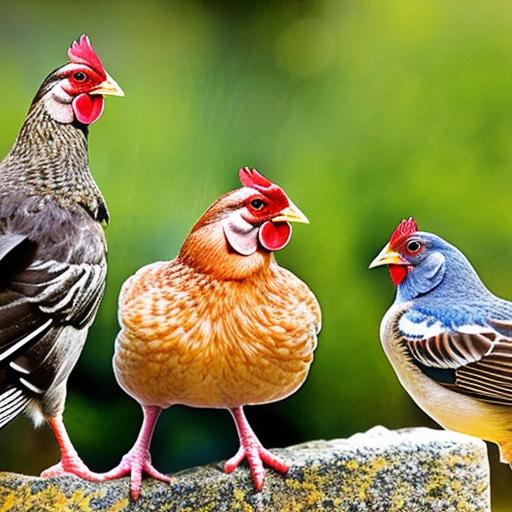Keeping chickens in your garden can be a rewarding and beneficial experience. Not only do chickens provide fresh eggs, but they also offer natural pest control and fertilizer for your garden. Having chickens in your backyard can be a fun and educational activity for the whole family. In this article, we will explore the benefits of keeping chickens in your garden, how to choose the right breed, the legalities of keeping chickens, how to build a chicken coop, feeding and caring for your chickens, tips for keeping them healthy and happy, managing waste and odor, the pros and cons of free-range chickens, protecting your garden from chicken damage, and harvesting and using eggs from your garden chickens.
Key Takeaways
- Keeping chickens in your garden can provide fresh eggs, natural pest control, and fertilizer for your plants.
- When choosing a breed of chicken, consider factors such as egg production, temperament, and climate adaptability.
- Before keeping chickens, research local laws and regulations to ensure you are in compliance.
- Building a chicken coop requires careful planning and consideration of factors such as size, ventilation, and predator protection.
- Feeding and caring for chickens involves providing a balanced diet, clean water, and regular health checks.
The Benefits of Keeping Chickens in Your Garden
One of the main benefits of keeping chickens in your garden is the fresh eggs they provide. There is nothing quite like collecting eggs from your own backyard and knowing exactly where they came from. Fresh eggs are not only delicious but also more nutritious than store-bought eggs. They are higher in omega-3 fatty acids and vitamin E, and lower in cholesterol.
Chickens also offer natural pest control for your garden. They love to eat insects such as slugs, snails, and beetles that can damage your plants. By allowing chickens to roam freely in your garden, they will help keep these pests under control without the need for harmful pesticides.
Another benefit of having chickens in your garden is the fertilizer they produce. Chicken manure is rich in nitrogen, phosphorus, and potassium, which are essential nutrients for plants. By allowing your chickens to roam freely or by collecting their manure and composting it, you can create a nutrient-rich soil amendment that will help your plants thrive.
Choosing the Right Breed of Chicken for Your Garden
When choosing a breed of chicken for your garden, there are several factors to consider. First, you need to think about the temperament of the breed. Some breeds are more docile and friendly, while others can be more aggressive. If you have children or pets, it is important to choose a breed that is known for being gentle and tolerant.
Another factor to consider is the egg-laying ability of the breed. If you are primarily interested in having fresh eggs, you will want to choose a breed that is known for being prolific layers. Some breeds, such as Leghorns and Rhode Island Reds, are known for their high egg production.
Climate is also an important consideration when choosing a breed of chicken. Some breeds are better suited for cold climates, while others are more heat-tolerant. It is important to choose a breed that can withstand the climate in your area to ensure the health and well-being of your chickens.
Understanding the Legalities of Keeping Chickens in Your Area
Before you start keeping chickens in your garden, it is important to understand the laws and regulations regarding poultry keeping in your area. Some cities and neighborhoods have restrictions on the number of chickens you can keep, the size of your coop, and the distance between your coop and neighboring properties.
It is also important to check if you need any permits or licenses to keep chickens. Some areas require you to obtain a permit or license before keeping chickens, while others may have specific guidelines or restrictions that you need to follow.
By understanding and following the legalities of keeping chickens in your area, you can avoid any potential issues or conflicts with neighbors or local authorities.
How to Build a Chicken Coop in Your Garden
Building a chicken coop is an essential part of keeping chickens in your garden. A well-designed coop will provide your chickens with a safe and comfortable living space while also protecting them from predators.
To build a chicken coop, you will need some basic materials such as wood, wire mesh, nails, screws, and roofing materials. The cost of building a coop can vary depending on the size and design you choose, but it is possible to build a simple coop for a relatively low cost.
When designing your coop, it is important to consider the size and number of chickens you plan to keep. Each chicken should have at least 4 square feet of space inside the coop and 10 square feet of space in the outdoor run. The coop should also have proper ventilation, nesting boxes for egg-laying, and roosting bars for the chickens to perch on.
Feeding and Caring for Your Garden Chickens

Feeding and caring for your garden chickens is an important part of keeping them healthy and happy. Chickens require a balanced diet that includes a combination of commercial feed, kitchen scraps, and fresh water.
There are different types of feed available for chickens, including starter feed for young chicks, grower feed for adolescent chickens, and layer feed for adult hens. It is important to provide your chickens with the appropriate feed for their age and stage of development.
In addition to commercial feed, you can also supplement your chickens’ diet with kitchen scraps such as fruits, vegetables, and grains. However, it is important to avoid feeding them anything toxic or harmful, such as chocolate, onions, or avocado.
Caring for your chickens also involves providing them with clean water at all times. Chickens need access to fresh water to stay hydrated and healthy. It is important to clean their water containers regularly to prevent the growth of bacteria or algae.
Tips for Keeping Your Garden Chickens Healthy and Happy
Keeping your garden chickens healthy and happy is essential for their well-being. Here are some tips to help you achieve this:
1. Provide enough space: Chickens need enough space to move around and exercise. Make sure they have plenty of room in their coop and outdoor run.
2. Keep their coop clean: Regularly clean the coop to remove waste and prevent the buildup of bacteria or parasites. Provide fresh bedding and nesting material for their comfort.
3. Monitor their health: Keep an eye on your chickens for any signs of illness or injury. If you notice any changes in behavior, appetite, or appearance, consult a veterinarian.
4. Provide toys and treats: Chickens enjoy pecking at toys and treats, such as hanging cabbage or a treat ball filled with grains. This helps keep them entertained and stimulated.
5. Protect them from predators: Secure your coop and outdoor run with sturdy fencing and wire mesh to keep out predators such as raccoons, foxes, and rats.
Managing Waste and Odor from Your Garden Chickens
Managing waste and odor from your garden chickens is important for maintaining a clean and healthy environment. Chicken manure can be a valuable source of fertilizer for your garden, but it can also produce strong odors if not managed properly.
One way to manage chicken waste is by composting it. Chicken manure is high in nitrogen, which makes it an excellent addition to your compost pile. However, it is important to compost the manure properly to ensure that it breaks down fully and does not pose a risk of contamination.
To control odor, you can use natural methods such as adding carbon-rich materials like straw or wood shavings to the coop bedding. This helps absorb moisture and reduce odors. Regularly cleaning the coop and removing waste will also help prevent odors from building up.
The Pros and Cons of Free-Range Chickens in Your Garden
Allowing your chickens to free-range in your garden has both pros and cons. On the positive side, free-ranging chickens have access to a wider range of food sources, such as insects, worms, and grass. They also have more space to roam and exercise, which can contribute to their overall health and well-being.
However, there are also some drawbacks to free-ranging chickens. They may cause damage to your garden by scratching up plants or digging holes. They can also be more vulnerable to predators, such as dogs, cats, or birds of prey.
If you choose to let your chickens free-range, it is important to take steps to protect them from predators. This can include using fencing or netting to create a secure outdoor run, providing them with shelter and hiding places, and supervising them when they are outside.
Protecting Your Garden from Chicken Damage
To protect your garden from damage caused by your chickens, there are several measures you can take. One option is to use fencing or chicken wire to create a barrier around your garden beds. This will prevent the chickens from accessing the plants and digging up the soil.
Another option is to use raised beds or containers for your plants. This will elevate them off the ground and make it more difficult for the chickens to reach them.
You can also provide alternative areas for your chickens to scratch and forage, such as a designated area with loose soil or a compost pile. By giving them their own space to explore and dig, they will be less likely to damage your garden.
Harvesting and Using Eggs from Your Garden Chickens
Harvesting eggs from your garden chickens is a rewarding experience. To ensure the freshness and quality of the eggs, it is important to collect them regularly. Chickens typically lay eggs in the morning, so it is best to check for eggs in the afternoon or evening.
When collecting eggs, handle them gently to avoid cracking or damaging the shells. It is also a good idea to wash the eggs before using them, especially if they are dirty. However, it is important not to wash them too far in advance, as this can remove the protective coating on the shells and make them more susceptible to bacteria.
Fresh eggs can be used in a variety of ways in your cooking. They can be scrambled, fried, boiled, or used in baking. They can also be used to make omelets, quiches, custards, and other delicious dishes.
Keeping chickens in your garden can be a rewarding and beneficial experience. Not only do chickens provide fresh eggs, but they also offer natural pest control and fertilizer for your garden. By choosing the right breed, understanding the legalities, building a chicken coop, feeding and caring for your chickens, and taking steps to keep them healthy and happy, you can enjoy the many benefits of having chickens in your backyard. So why not consider adding some feathered friends to your garden?
If you’re considering keeping chickens in your garden, you’ll want to make sure you have the right setup to provide them with a comfortable and safe environment. One important aspect is the chicken coop. In a recent article on Poultry Wizard, Hannah Montana shares her experience and tips on building a chicken coop that is both functional and aesthetically pleasing. She discusses the importance of incorporating a nest box into the design, providing chickens with a cozy space to lay their eggs. To learn more about Hannah’s innovative chicken coop design, check out her article here. Additionally, if you’re interested in the portability of chicken coops, Poultry Wizard offers another informative article on the benefits and considerations of having a portable chicken coop. You can find it here.
FAQs
What are the benefits of keeping chickens in your garden?
Keeping chickens in your garden can provide you with fresh eggs, natural pest control, and fertilizer for your garden. They also make great pets and can be a fun addition to your backyard.
What are the legal requirements for keeping chickens in your garden?
The legal requirements for keeping chickens in your garden vary depending on your location. Some cities and towns have specific regulations regarding the number of chickens you can keep, the size of your coop, and the distance your coop must be from your neighbors’ property. It is important to check with your local government to ensure you are following all regulations.
What do chickens need to be healthy and happy?
Chickens need access to fresh water, food, and a safe and secure coop to sleep in at night. They also need space to roam and scratch, as well as protection from predators. Providing them with a dust bath area and some toys or perches can also help keep them happy and healthy.
What should you feed your chickens?
Chickens need a balanced diet that includes protein, carbohydrates, and vitamins and minerals. You can feed them a commercial chicken feed or supplement their diet with kitchen scraps, fruits, and vegetables. It is important to avoid feeding them anything that is toxic to chickens, such as avocado, chocolate, and caffeine.
How do you care for chickens in the winter?
Chickens can handle cold temperatures, but they need protection from wind and moisture. You can insulate their coop and provide them with a heat lamp or heated water dish to keep them warm. It is also important to make sure they have access to fresh water that is not frozen.
Meet Walter, the feathered-friend fanatic of Florida! Nestled in the sunshine state, Walter struts through life with his feathered companions, clucking his way to happiness. With a coop that’s fancier than a five-star hotel, he’s the Don Juan of the chicken world. When he’s not teaching his hens to do the cha-cha, you’ll find him in a heated debate with his prized rooster, Sir Clucks-a-Lot. Walter’s poultry passion is no yolk; he’s the sunny-side-up guy you never knew you needed in your flock of friends!







